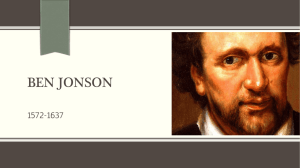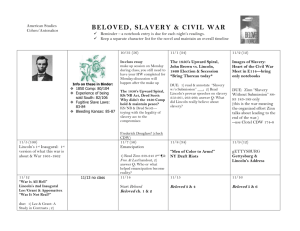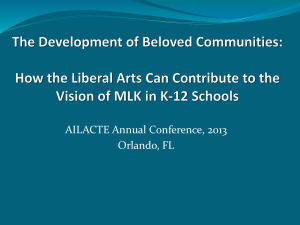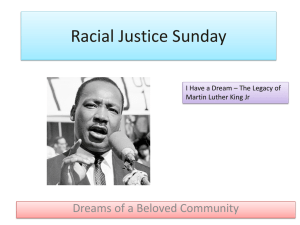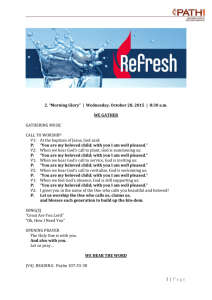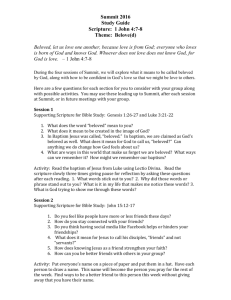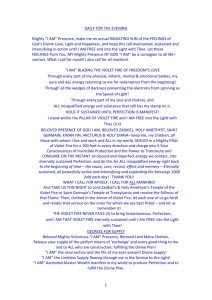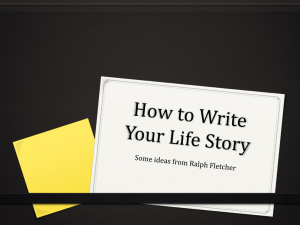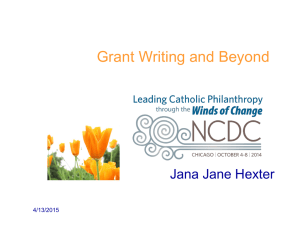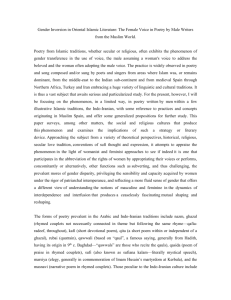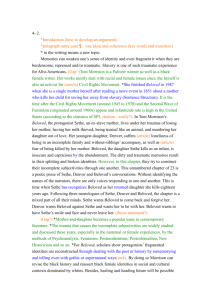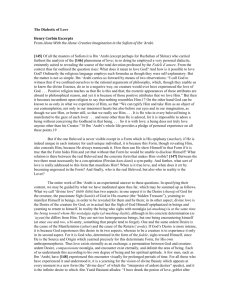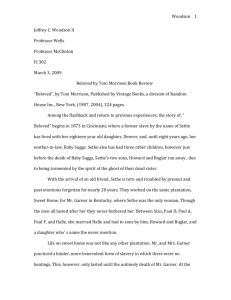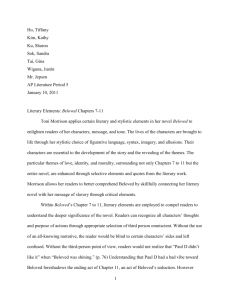Proclaim011914-Beloved Community – Josiah Royce & Martin King
advertisement
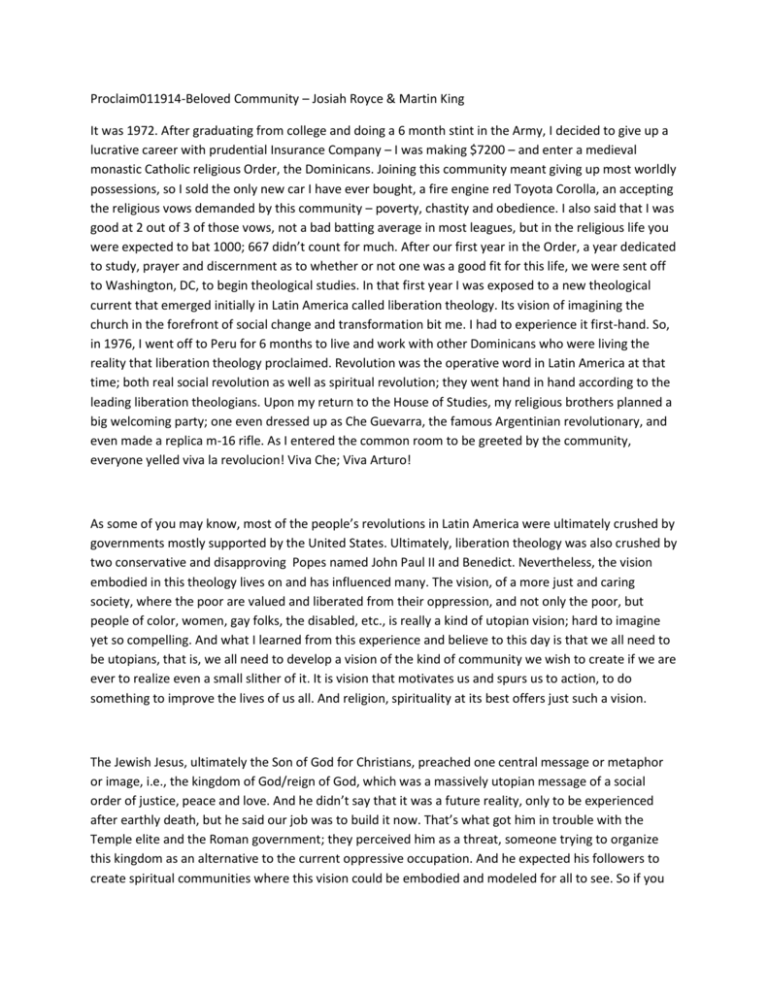
Proclaim011914-Beloved Community – Josiah Royce & Martin King It was 1972. After graduating from college and doing a 6 month stint in the Army, I decided to give up a lucrative career with prudential Insurance Company – I was making $7200 – and enter a medieval monastic Catholic religious Order, the Dominicans. Joining this community meant giving up most worldly possessions, so I sold the only new car I have ever bought, a fire engine red Toyota Corolla, an accepting the religious vows demanded by this community – poverty, chastity and obedience. I also said that I was good at 2 out of 3 of those vows, not a bad batting average in most leagues, but in the religious life you were expected to bat 1000; 667 didn’t count for much. After our first year in the Order, a year dedicated to study, prayer and discernment as to whether or not one was a good fit for this life, we were sent off to Washington, DC, to begin theological studies. In that first year I was exposed to a new theological current that emerged initially in Latin America called liberation theology. Its vision of imagining the church in the forefront of social change and transformation bit me. I had to experience it first-hand. So, in 1976, I went off to Peru for 6 months to live and work with other Dominicans who were living the reality that liberation theology proclaimed. Revolution was the operative word in Latin America at that time; both real social revolution as well as spiritual revolution; they went hand in hand according to the leading liberation theologians. Upon my return to the House of Studies, my religious brothers planned a big welcoming party; one even dressed up as Che Guevarra, the famous Argentinian revolutionary, and even made a replica m-16 rifle. As I entered the common room to be greeted by the community, everyone yelled viva la revolucion! Viva Che; Viva Arturo! As some of you may know, most of the people’s revolutions in Latin America were ultimately crushed by governments mostly supported by the United States. Ultimately, liberation theology was also crushed by two conservative and disapproving Popes named John Paul II and Benedict. Nevertheless, the vision embodied in this theology lives on and has influenced many. The vision, of a more just and caring society, where the poor are valued and liberated from their oppression, and not only the poor, but people of color, women, gay folks, the disabled, etc., is really a kind of utopian vision; hard to imagine yet so compelling. And what I learned from this experience and believe to this day is that we all need to be utopians, that is, we all need to develop a vision of the kind of community we wish to create if we are ever to realize even a small slither of it. It is vision that motivates us and spurs us to action, to do something to improve the lives of us all. And religion, spirituality at its best offers just such a vision. The Jewish Jesus, ultimately the Son of God for Christians, preached one central message or metaphor or image, i.e., the kingdom of God/reign of God, which was a massively utopian message of a social order of justice, peace and love. And he didn’t say that it was a future reality, only to be experienced after earthly death, but he said our job was to build it now. That’s what got him in trouble with the Temple elite and the Roman government; they perceived him as a threat, someone trying to organize this kingdom as an alternative to the current oppressive occupation. And he expected his followers to create spiritual communities where this vision could be embodied and modeled for all to see. So if you read the Acts of the Apostles, the stories of the community after his death and resurrection, they live together and share everything they have; no rich and poor, no men dominating women, but equal sharing; the first communists, if you will, but a loving, caring, non-violent communism. They created a utopian community where all were to be equal. That was Jesus’ vision in line with the prophets from the older Hebrew Testament. So today we remember Martin Luther king, Jr., who also lived by a vision which he referred to as the “beloved community,” a vision similar to Jesus’ kingdom of God, but maybe a little more sensitive to including all peoples. King took this expression from an early 20th century philosopher named Josiah Royce who defined the beloved community in this way: “beloved community is the mutually cooperative and voluntary venture of persons in which they realize the solidarity of the human family by assuming responsibility for one another as children of God.” (taken from Walter Fluker) And Dr. King would add that this vision, this ideal called beloved community becomes actual “only when we are actually working alongside, responding to, building trust with, and becoming trustworthy with concrete others in their more local communities.” So beloved community is an ideal, a vision, which we must make real. But for Royce and King, we are not alone, it has divine energy behind, embodied in the notion coined by the great Unitarian, Theodore Parker, that the moral arc of the universe bends towards justice. Parker believed that, Royce believed, King believed that; do we?! I honestly do. From the day I was bitten to answer a call, an eventually traveled to Peru, I’ve been motivated by this vision that I think I supposed to work towards. And I’ve always felt that that was one of the key reasons why we build churches and synagogues and mosques and Temples. We must model the vision in our lives as church persons, then take it into the community. This still gives me energy. We might all ask ourselves: what drives us, what’s gets us out of bed, what motivates us in our individual and communal lives? So is it just an ideal or have I ever seen it realized? I think I’ve seen it realized a lot; not fully, not perfectly yet really. One of my mentors in the Dominican Order was a utopian, a dreamer, a visionary who worked at Vanderbilt University in Nashville as a chaplain. Not far from Vanderbilt is a state prison and Jack always had the idea of housing together students from wealthy, elite backgrounds, and exoffenders as they were released from prison. I spent two summers helping Jack make this a reality by first renovating an abandoned house, then serving as the building manager. Jack’s vision was that students would bring to the relationship high aspirations and career plans, and ex-cons would bring real life experience and resiliency, many of whom came from struggling, difficult backgrounds. In the process students would understand their privilege and ex-prisoners the possibility of a hopeful future. Jack called this beloved community, this utopian ideal, Dismas House, after the “good” thief who died beside Jesus on the cross. There are currently a dozen or so Dismas Houses across the country, all glimpses of what might be a beloved community. However fleeting, Family Promise is a beloved community, I believe, as homeless families and other community members come together for weeks at a time in churches and share stories and food and shelter and dreams of a better future. ECCO is a beloved community as it organized hundreds of people and dozens of religious congregations to get an increase in the minimum wage on the ballot, a wonderful example of a joint effort by people across ethnic and class lines to work in solidarity to make our communities more just. Grace center is a beloved community even if some of the neighbors object to some of the people entering our Gloucester churches every day for food and comfort and fellowship. On January 30th, at 7pm, at our UU church in Gloucester we will, once again, continue the dialogue about our dream of bringing together all kinds of people and creating even for a day a beloved community. Maybe some of us can be there. Open Door Pantry is a beloved community each evening that we prepare a meal and build relationships with the individuals and families come for nourishment and fellowship. In all of these happenings, we get a glimpse of a beloved community, what could be; each encounter we are building something holy. “It is the community that we create whenever we dwell with other persons in the spirit of (agapic) love. Insofar as we recognize the personhood of our fellow human persons -(whatever our differences)-and they do likewise, then we are actualizing he Beloved Community on earth.” (King/Tunstall) If you think on or pray on our UU principles, you must acknowledge that we are utopians, dreamers, visionaries – everyone’s inherent worth, justice, equity and compassion, acceptance of all, world community and interdependence of all existence!!!Really?! Do we believe that? Do we try to embody it? Or like the three vows I took many years ago, are we good at 2 out of 3;1 out of 3? King, along with so many others, accomplished a lot (as the saying went, if Rosa had not sat down, Martin would not have stood up!). Because of the work laws changed; attitudes changed; lives changed. But, to me, his greatest gift was he believed, he dreamed, he imagined, he offered a vision and, on occasion, he realized it. And King believed that the religious community was key in realizing the beloved community. We are the “moral custodians” of society in his view. “The church must be reminded that it is not the master or the servant of the state, but rather the conscience of the state. It must be the guide and critic of the state, and never its tool. If the church does not recapture its prophetic zeal, it will become an irrelevant social club without moral or spiritual authority.” That’s the challenge he passed on to us; carry on the beloved community vision or die. Part of the idea of believed community first articulated by Josiah Royce is that we are not individual persons, rather we are communal persons – we realize our own potential and fullness in community. I may be nuts but I think this is a special community and I believe we are called to great things, despite whatever limitations we have. And celebrating the legacy of Dr. King is a great time for us all to ask: why do we come to church; what are we being called to in our lives; what is it to be a person and a Unitarian Universalist in this 2014? For me personally, I’m sure Prudential Insurance Company is a fine organization but I’m grateful that I heard other voices and followed another path that, ultimately, landed me on this doorstep. I can think of no other beloved community I’d rather be part of in my mature years.
